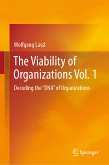Managing Hybrid Organizations (eBook, PDF)
Governance, Professionalism and Regulation
Redaktion: Alexius, Susanna; Furusten, Staffan


Alle Infos zum eBook verschenken

Managing Hybrid Organizations (eBook, PDF)
Governance, Professionalism and Regulation
Redaktion: Alexius, Susanna; Furusten, Staffan
- Format: PDF
- Merkliste
- Auf die Merkliste
- Bewerten Bewerten
- Teilen
- Produkt teilen
- Produkterinnerung
- Produkterinnerung

Hier können Sie sich einloggen

Bitte loggen Sie sich zunächst in Ihr Kundenkonto ein oder registrieren Sie sich bei bücher.de, um das eBook-Abo tolino select nutzen zu können.
A much-needed addition to literature, this timely edited collection aims to provide clarity and understanding on how modern organizations work. The authors explore the characteristics of hybrid organizations in contemporary society, taking into account the complex societal challenges that face businesses today. Arguing that hybrid organizations are in fact not a new phenomenon, this thought-provoking collection goes beyond existing research and re-evaluates our traditional understanding of this concept. Scholars of organization, management and innovation will find this book an insightful read,…mehr
- Geräte: PC
- ohne Kopierschutz
- eBook Hilfe
- Größe: 6.9MB
![Organizing for the Digital World (eBook, PDF) Organizing for the Digital World (eBook, PDF)]() Organizing for the Digital World (eBook, PDF)73,95 €
Organizing for the Digital World (eBook, PDF)73,95 €![The Viability of Organizations Vol. 2 (eBook, PDF) The Viability of Organizations Vol. 2 (eBook, PDF)]() Wolfgang LasslThe Viability of Organizations Vol. 2 (eBook, PDF)40,95 €
Wolfgang LasslThe Viability of Organizations Vol. 2 (eBook, PDF)40,95 €![The Viability of Organizations Vol. 1 (eBook, PDF) The Viability of Organizations Vol. 1 (eBook, PDF)]() Wolfgang LasslThe Viability of Organizations Vol. 1 (eBook, PDF)40,95 €
Wolfgang LasslThe Viability of Organizations Vol. 1 (eBook, PDF)40,95 €![How Organizations Manage the Future (eBook, PDF) How Organizations Manage the Future (eBook, PDF)]() How Organizations Manage the Future (eBook, PDF)81,95 €
How Organizations Manage the Future (eBook, PDF)81,95 €![IT Management in the Digital Age (eBook, PDF) IT Management in the Digital Age (eBook, PDF)]() Nils UrbachIT Management in the Digital Age (eBook, PDF)38,95 €
Nils UrbachIT Management in the Digital Age (eBook, PDF)38,95 €![Organizing for Digital Innovation (eBook, PDF) Organizing for Digital Innovation (eBook, PDF)]() Organizing for Digital Innovation (eBook, PDF)113,95 €
Organizing for Digital Innovation (eBook, PDF)113,95 €![Agent-Based Simulation of Organizational Behavior (eBook, PDF) Agent-Based Simulation of Organizational Behavior (eBook, PDF)]() Agent-Based Simulation of Organizational Behavior (eBook, PDF)73,95 €
Agent-Based Simulation of Organizational Behavior (eBook, PDF)73,95 €-
-
-
Dieser Download kann aus rechtlichen Gründen nur mit Rechnungsadresse in A, B, BG, CY, CZ, D, DK, EW, E, FIN, F, GR, HR, H, IRL, I, LT, L, LR, M, NL, PL, P, R, S, SLO, SK ausgeliefert werden.
- Produktdetails
- Verlag: Springer International Publishing
- Seitenzahl: 364
- Erscheinungstermin: 5. Dezember 2018
- Englisch
- ISBN-13: 9783319954868
- Artikelnr.: 54729342
- Verlag: Springer International Publishing
- Seitenzahl: 364
- Erscheinungstermin: 5. Dezember 2018
- Englisch
- ISBN-13: 9783319954868
- Artikelnr.: 54729342
- Herstellerkennzeichnung Die Herstellerinformationen sind derzeit nicht verfügbar.







